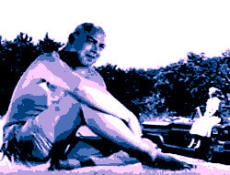Film Review
The phenomenal success of Jack Arnold's
The Incredible Shrinking Man
(1957) was what led American International Pictures to rush into
production a film in which atomic radiation caused a man not to
diminish in size but to grow to gigantic proportions. It so
happened that AIP owned the rights to Homer Eon Flint's 1928 novella
The Nth Man, in which a man grows
to a height of ten miles, so it looked as if the studio had within its
grasp another sure-fire hit that would allow it to cash in on the craze
for radiation-created monstrosities that was presently sweeping the
globe. When Roger Corman walked off the project, Bert I.
Gordon was hired to replace him, his only previous directing credit
being on the laughably bad monster movie
King Dinosaur (1955). As
befitted his initials (B.I.G.), Gordon would end up devoting virtually
his entire career to making films featuring oversized creatures,
effectively repeating over and over again the basic premise of his
first feature for A.I.P.
The Amazing Colossal Man has
none of the sophistication and poetry of Jack Arnold's film - it
basically just reworks an established formula, making the most of the
fairly primitive special effects that were available at the time to a
low budget production. Back projection and standard matting
techniques avoided the need for detailed miniature sets and are used
effectively by Gordon to create a fairly convincing effect when the
titular colossus goes on his rampage (as he must surely do) in the
film's final dramatic act. Cinematographer Joseph F. Biroc lends
a suitably gloomy feel to the piece (his impressive list of credits
include
It's a Wonderful Life,
Donovan's Brain and
The Flight of the Phoenix),
particularly the early part of the film which is more character-centric
and admirably carried by Cathy Downs and William Hudson. By
contrast, the star of the film, Glenn Langan, gives a somewhat O.T.T.
performance that ends up being bigger than the character he is playing.
The science is horrendously shaky in parts (apparently the heart
consists of a single cell...) but if you're the kind of person who's
worried about scientific accuracy you probably wouldn't be watching the
film in the first place. Aside from its excursions into the
realms of fantasy and obvious lack of scientific understanding, the
script is reasonably well written (the protagonists talk like
human beings) and holds the attention well - at least it does up until
the midway point, after which the film ends up as just another bog
standard monster movie. Reasonable as the effects are for a
cheapish film of this time, there isn't much in the way of surprise and
there's a distinct lack of pathos and dramatic impact in the rushed
denouement. Still, the film is somewhat better than the sequel
that Bert Gordon subsequently directed,
War of the Colossal Beast (1958),
which carries on (improbably) where
The
Amazing Colossal Man signed off, after its abrupt plunge into mediocrity.
© James Travers 2015
The above content is owned by frenchfilms.org and must not be copied.
Film Synopsis
A plutonium bomb is to be detonated in the middle of the Nevada
desert. For some reason, the bomb's explosion is delayed and when
a light aircraft crashes in the vicinity of the bomb Colonel Glenn
Manning feels impelled to leap out of the protective trench and go to
the aid of the crash survivors. Before Manning can reach the
smashed plane the bomb goes off and he is caught in the blast.
Badly burned, he is rushed to hospital but his chances of survival are
minimal. His fiancée Carol Forrest has an anxious few
hours waiting for news of his condition as surgeon Dr Linstrom tends to
his injuries. The following morning, Linstrom is astonished to
find that Manning's skin has completely healed and he is at once
excited by the recuperative possibilities of plutonium radiation.
When Carol next visits the hospital, her fiancée has been moved
to another facility, at a secret military base in Nevada. Forcing
her way into the facility, Carol is horrified to find that Manning has
almost trebled in height. Dr Linstrom is forced to admit that the
radiation has caused Manning's body cells to multiply at a far greater
rate than normal, leading to a progressive increase in his size.
As he works on a possible cure that will restore the colonel to his
former height Manning continues to grow....
© James Travers
The above content is owned by frenchfilms.org and must not be copied.


